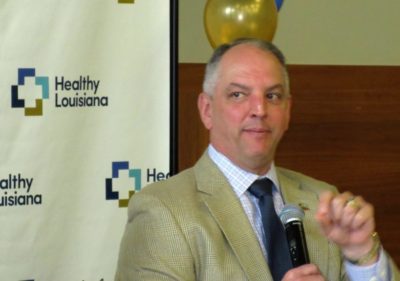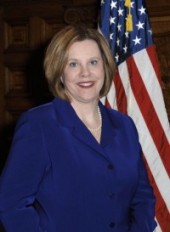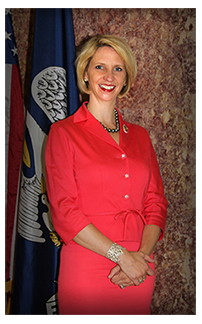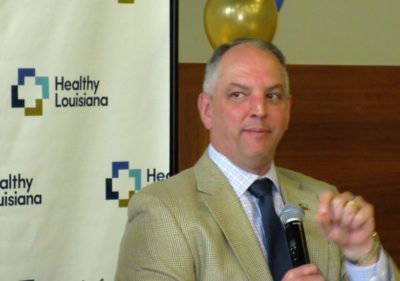
This article was done in partnership with Kaiser Health News.
Aretha Frison got an unusually helpful mailing recently through the Louisiana food stamp program.
The letter indicated that she could qualify for Medicaid coverage beginning next month. Frison, usually a journalist by occupation, has been able to work only part time at an animal hospital while suffering with major depression. Rent and other expenses have been a struggle, she told reporters last week when she visited a New Orleans health clinic. She said she “has been hitting a lot of brick walls’’ when it comes to obtaining psychiatric treatment.

“It’s been a tough road for me to get services,’’ said Frison, 38.
Now, though, “it seems like Medicaid is the golden ticket,’’ she said.
Frison is one of the more than 200,000 Louisianans who have signed up or been enrolled this month in the state’s newly enacted expansion of Medicaid, under the Affordable Care Act.
On July 1, Louisiana will become the 31st state to go forward with expanding the government program, which is jointly financed by state and federal governments. On his second day in office, Gov. John Bel Edwards, a Democrat who expressed support for expanding Medicaid during his campaign last year, signed an executive order that began the expansion process.

It will extend coverage to people up to 138 percent of the federal poverty level, which is $16,394 for an individual. With the move, Louisiana follows Arkansas and Kentucky as the only Southern states to adopt expansion.
Louisiana officials project that the influx of newly insured from Medicaid expansion eventually will reach 375,000. Just last Monday, 3,000 people enrolled for coverage, state officials say.
Edwards told health care reporters gathered in Baton Rouge last week that 70 percent of the people who will get coverage are full-time workers, in such industries as construction and hospitality.
“I always said Medicaid expansion is the right thing to do,’’ he said.
One argument Gov. Edwards emphasized is that prior to this year, Louisianans helped pay for Medicaid expansion in other states (through their federal taxes), but got nothing in return.
He knows the process won’t be easy. “We have the benefit of the experience of other states,” he said, but acknowledged, “I know we’re going to have some hiccups.”
A tale of two (Southern) states
Louisiana and Georgia have many political similarities. Both states also have somewhat similar health issues affecting their populations.
And until recently, both states had similar approaches to Medicaid expansion.
Georgia Gov. Nathan Deal, a Republican, has rejected expansion since he took office in 2011. Bobby Jindal, a Republican who was governor of Louisiana until early this year, took the same position through his eight years as chief executive.
Under Jindal, efforts to enact expansion in Louisiana went nowhere. “For years, we were not allowed to speak [about] it,” said Jen Steele, Louisiana’s Medicaid director.

In Georgia, anti-expansion sentiment goes beyond Gov. Deal. In 2014, the Republican-led General Assembly added its own barrier to expansion. It passed a law that requires legislative approval — not simply a governor’s decision — for any such move in the future.
Deal, like legislative leaders, has repeatedly pointed to the cost of expansion, saying it eventually would put too much strain on the state budget.
The Georgia Republican Party, at its recent convention, passed a resolution calling for GOP legislators to “show their continued support of responsible state budgeting by publicly voting against and aggressively oppose any expansionary form of Medicaid pursuant to the Affordable Care Act (Obamacare) in the state of Georgia.”
Yet state Sen. Renee Unterman (R-Buford), who chairs the Senate Health and Human Services Committee, recently made headlines calling for Georgia to “re-examine’’ the possibility of Medicaid expansion, perhaps looking at a “waiver’’ plan similar to the Arkansas expansion program.

“We have to open that box and look just a little bit and see what’s available,” Unterman told WABE. “Hopefully, if you draw down federal dollars, you can free up some of those state dollars. Right now, we’re just pumping out state dollars to stay in the midst of the crisis.”
State Rep. Sharon Cooper of Marietta, the Republican chairwoman of the Georgia House’s Health and Human Services Committee, told Modern Healthcare that she and her colleagues will entertain the proposals, but added that she doesn’t believe an expansion plan will solve the problem of access to care.
“The problem with expansion is, ‘Who is going to treat these people?’ ” Cooper said. “We don’t have the physicians, nurse practitioners or physician assistants to care for them in rural areas of the state.”
Since the beginning of 2013, five rural hospitals have closed in Georgia.
Effects on hospitals may vary
One key difference between Georgia and Louisiana is the Peach State’s much stronger fiscal situation. Louisiana, where the energy industry is very important, has been hit hard by a decline in oil prices. Edwards inherited what he calls a record state deficit.

But ironically, that deficit eased the road for expansion, officials say. “The budget crisis was a catalyst for the Legislature to come aboard,” said Dr. Rebekah Gee, secretary of the Louisiana Department of Health.
A study found that the expansion would produce net savings of $184 million for Louisiana, including in-state money paid to hospitals, and moving some current Medicaid patients into a better federal matching rate of 95 percent.
Other states have done studies showing projected savings from expansion. (Here’s a previous GHN article on Ohio and Michigan reports.)
Like Georgia, Louisiana has a population with many health needs.
America’s Health Rankings puts Louisiana 50th among states — 10 spots behind Georgia. The state has high rates of obesity, hypertension and diabetes, and a high mortality rate from cancer.
Louisiana also has a very high share of people living in poverty, but Georgia has a larger percentage without health insurance (16 percent).
“This isn’t just about expanding health care coverage and saving money,’’ Edwards said. “We want healthier people in Louisiana.”

Part of the push to enroll new people in Medicaid has come through a unique mailing to 105,000 food stamp recipients, like Frison. The mailing gives them four questions to answer to determine whether they’re eligible.
About 180,000 other people were ‘’auto-enrolled’’ from a previous “waiver’’ program that did not provide coverage for hospital services or prescription drugs.
No extra state money was appropriated for marketing and publicizing Medicaid expansion, so the state cobbled together funding from the Robert Wood Johnson Foundation and other sources.
Ruth Kennedy, director of the Medicaid expansion effort, said the state also learned from the messy rollout of the ACA’s insurance exchanges in late 2013 and early 2014, when constant technical problems snarled the initial enrollment process.
“We put in a great deal of effort getting to Day Two without an absolute meltdown,” she said.
Enrollment events have brought in people like Jaylin Davis of Baton Rouge, who lost Medicaid when he turned 19. Jaylin, who works at a local Wal-Mart, told a reporter after signing up at Baton Rouge Community College that he was glad to have the chance to get the insurance coverage back.
Health plans say they are hiring dozens of new employees to handle the new enrollees.

Though hospitals in other states have reported substantial revenue gains as a result of expansion, Louisiana’s complicated system of funding for hospitals may not yield many clear winners.
Louisiana has had an unusually heavy reliance on ‘’disproportionate share’’ dollars, which the state pays out to those hospitals serving a large number of indigent or uninsured patients.
While the giant Ochsner Health System said expansion would be slightly positive financially, Baton Rouge-based Our Lady of the Lake said expansion may bring a payment cut.
But low-income patients should benefit greatly.
For those who come to CrescentCare, including many with HIV, the new coverage will make significant improvements in care, staff at the New Orleans health center told reporters.
More than half of its 4,000 medical care patients may qualify for Medicaid under expansion.
Alicia Honomichl, an RN, says CrescentCare nurses currently “spend so much time coordinating services for patients.’’
She said expansion will help more people obtain PrEP, a medication that can prevent a person from getting HIV from an infected individual, whether through sexual contact or sharing of drug-injection equipment.
Dr. Peter DeBlieux, chief medical officer of the brand-new University Medical Center New Orleans, says the Medicaid change is “earth-shattering’’ for his patients.
Historically, uninsured patients went to emergency rooms for routine care — a wasteful, inefficient use of health care resources — because they had nowhere else to go, said Dr. Jennifer Avegno.

DeBlieux, who was a physician at Charity Hospital in New Orleans when it was evacuated during Hurricane Katrina in 2005, adds that patient access to regular medications will be “low-hanging fruit’’ that will come from expansion. “I expect [cancer] screenings to skyrocket.”
State officials are voicing optimism about Louisiana’s move. “I believe our approach will be a national model,” Gee said, adding that other Southern states “are watching us.”
Most Republicans at the national level remain vocal critics of expansion, and they support repeal or weakening of the ACA itself. But Edwards told reporters that if Democrats retain the White House and the health law stays in place, “I fully expect there will be a number of states opting into Medicaid expansion.”

